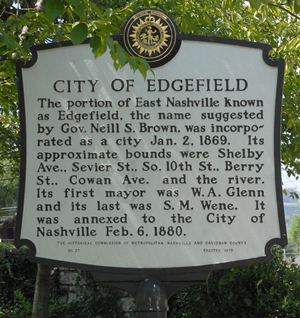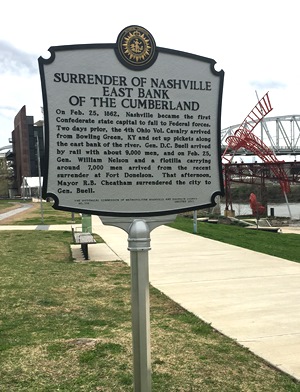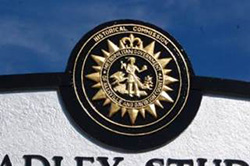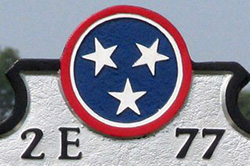
In 1967, the newly-formed Metropolitan Historical Commission of Nashville and Davidson County initiated a historical marker program to commemorate significant people, places, and events in the city's past. Marker Number One, "Heaton's Station," was erected at Lock One Road in 1968. The marker program is now one of the Historical Commission's longest-running and most successful programs. By the end of 2022, 250 historical markers have been erected across the county. A map of the historical markers can be found on the Metro Open Data Portal.
Marker Guidelines
The following guidelines are designed to assist individuals and organizations who wish to sponsor a historical marker through the Metropolitan Historical Commission's historical marker program. You may download a copy of the guidelines and use the attached documentation sheet to complete your application packet.
Download the Historical Marker Program Guidelines
Significance
The subject of any marker erected by the Metropolitan Historical Commission should be a person, place, structure, or event that has local importance and, wherever possible, significance in the broad pattern of Nashville and Tennessee history. The event, person, structure, or place, should have achieved historical significance fifty years or more ago. Exceptions may be made by the Metro Historical Commission if the sponsoring party can show that it is of exceptional significance.
Examples of markers that would not meet our criteria for significance:
- markers to specific land grants
- markers solely of genealogical or family interest
- markers to living persons
Markers to unprotected archaeological sites will also not be considered, not because of a lack of historical significance, but so as not to endanger the archaeological artifacts by drawing attention to them before they can be properly assessed and secured. Protected archaeological sites—such as Aaittafama’ Archaeological Park—are excellent candidates for a historical marker.
Historical Fact
Every statement on a Metropolitan Historical Commission marker must satisfy two conditions: Is it significant? Is it accurate?
Historical significance may be subjective, but factual accuracy may be proved, and documentation of every fact is required. A permanent file on each marker is kept at the Commission office so that answers may always be provided to anyone who asks for verification of a particular marker or for additional information on the subject.

Location
A suitable and safe location should be designated in the marker application. Generally, markers are placed along a public road or on public property. Exceptions may be made that allow a marker to be placed on private property. These exceptions must be approved by the Historical Commission prior to installation. In all cases, the site must be adjacent to a public road or property to facilitate installation and maintenance. In the event that the proposed marker is to be located on private property, written consent of the owner must be filed with the Commission.
Installation
All Metropolitan Historical Commission markers are installed by Metro's Public Works Department.
Cost
Standard markers cost approximately $3500-$4000 and are generally funded by the applicant. Contact the MHC staff for more specific prices on historical markers.
Text specifications
Marker text is limited to 480 characters and spaces. Markers of this length are cast with 1-inch letters. The same text will appear on both sides of the marker. In some cases, it may be appropriate for a longer text to "wrap" the marker, with text continuing on the reverse side of the marker, or you may want to have text on one side and a metal photograph on the other. These markers are more expensive than standard markers.

Marker Approval
The Commission staff and the sponsoring party will work together to write a suitable marker text before it will be submitted to the Commission for approval. If the Commission staff feels that the submitted draft text is not compatible with the standards of the Metropolitan Historical Commission, the requesting party will be notified immediately. The staff will help with any corrections or improvements that can be made to revise the proposed text.
Once the staff and sponsoring party agree to a suitable marker text, it will be submitted to the Commission for approval. The Commission generally will consider and vote on the proposed marker at the next regularly scheduled Commission meeting. The Commission meets monthly on the third Monday of the month. After Commission approval, allow approximately twenty-four (24) weeks manufacturing time for the casting, shipping, and erection of the marker.
Marker proposals must be submitted for consideration to the Metropolitan Historical Commission staff four (4) to six (6) weeks before a regular meeting of the Commission.
Missing or Damaged Historical Markers
Do you know of a damaged or missing historical marker? If it is a Metro marker, the circle at the top will have the Metropolitan Government seal and you should call 615-862-7970.

If it is a state marker, the circle at the top will have the tri-star logo that is the symbol of Tennessee. For state markers please call Linda Wynn at 615-770-1093.

